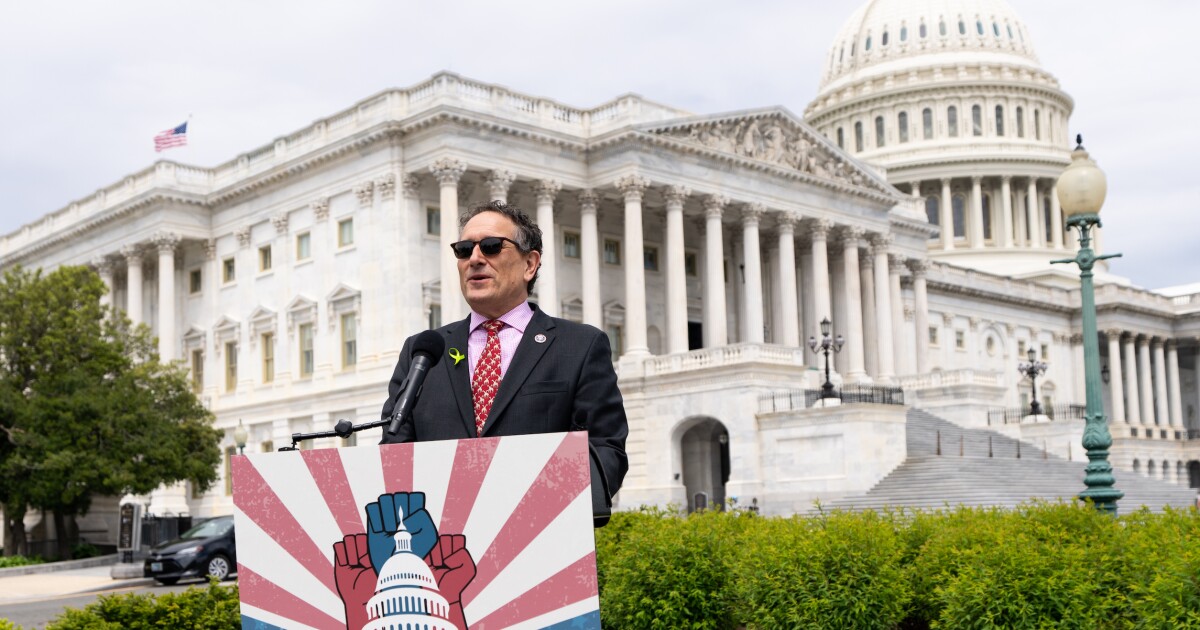

The largest pro-Israel lobbying group in the United States is sharpening its attacks on Rep. Andy Levin of Michigan, a progressive lawmaker seeking reelection in a suburban enclave of Detroit.
The American Israel Public Affairs Committee, or AIPAC, has targeted Levin over his criticism of Israel and political alignment with “the Squad,” a left-wing group of pro-Palestinian lawmakers. The barbs are part of a broader effort by the organization, which advocates a strong U.S.-Israel relationship, to defeat the small but growing number of Israel critics running for Congress, largely in Democratic primaries.
GOP SENATE CANDIDATE BLAKE MASTERS PAINTED AS ANTISEMITIC IN NEW AD
Levin, the scion of a prominent family in Michigan politics, is running in the Aug. 2 Democratic race for the state’s deep-blue 11th Congressional District, where winning the party’s nomination is tantamount to victory in November.
He’s vying for the same seat as Rep. Haley Stevens, a fellow Democrat first elected to the House in 2018 along with Levin, after the contours of Michigan’s House districts were scrambled in the decennial line-redrawing process. The state lost a seat due to relatively slow population growth over the past decade, slicing its House delegation from 14 to 13 members.
A significant flashpoint in the Democrat-on-Democrat fight so far has been support for Israel. Despite Levin insisting that he is pro-Israel, Stevens and her supporters, most notably AIPAC, have tried to put him on the defensive on the issue.
AIPAC used the recent Israeli holiday of Jerusalem Day to attack Levin for sponsoring legislation last year that would require the U.S. to refer to East Jerusalem, and the West Bank and Gaza more broadly, as occupied Palestinian territory in official documents.
The holiday commemorates Israel capturing East Jerusalem, which was under Jordanian control for almost two decades, in the Six-Day War of 1967. Israel annexed the territory in 1980.
“For 19 years, Jews were cut off from their holiest sites in Jerusalem. On this day 55 years ago, Israel reunited the city and Jews again had access to their holy sites,” AIPAC tweeted Tuesday.
“Now, @Andy_Levin is rewriting history and wants to cut the Western Wall from Israel,” the group continued, referring to Judaism’s holiest prayer site. “That’s not pro-Israel.”
For 19 years, Jews were cut off from their holiest sites in Jerusalem.
On this day 55 years ago, Israel reunited the city and Jews again had access to their holy sites.
Now, @Andy_Levin is rewriting history and wants to cut the Western Wall from Israel.
That’s not pro-Israel. pic.twitter.com/sEZQNelHWr
— AIPAC (@AIPAC) June 7, 2022
Hadar Susskind, the president of Americans for Peace Now, defended Levin, claiming that AIPAC isn’t sincerely interested in a two-state solution to the Israeli-Palestinian conflict. His nonprofit group, like the United Nations, believes that a lasting peace will require Israel to return to its 1967 borders, with East Jerusalem under Palestinian control.
“@Andy_Levin believes in a 2SS. @AIPAC pretends to do so as well but, unlike Andy who is willing to actually do something about it, AIPAC loves endless occupation,” Susskind tweeted.
Levin, who served as the president of a synagogue before running for office, has defended himself against attacks that he’s not pro-Israel by pointing to his vote to replenish Israel’s Iron Dome defense system. Levin has also come out against the boycott, divestment, and sanctions movement embraced by many progressives.
But he has been outspoken on the Israeli government’s treatment of Palestinians as well and has defended fierce critics of Israel, such as Rep. Rashida Tlaib, who represents Michigan’s 13th District.
A former AIPAC president raised eyebrows earlier this year when he called Levin “arguably the most corrosive member of Congress to the U.S.-Israel relationship,” citing the Levin family’s political clout as well as the congressman’s “highly problematic legislation.”
Levin’s bill, titled the “Two-State Solution Act,” would prevent U.S. security assistance to Israel from being used to further “occupation or annexation” in the West Bank and Gaza and would require that goods created in those regions not say “Made in Israel.” The legislation is not expected to pass Congress.
Stevens, Levin’s centrist opponent, has pledged to be a stalwart defender of Israel, earning her the endorsement of not just AIPAC, but the advocacy groups Democratic Majority for Israel and Pro-Israel America as well. The support could prove influential in a district that covers the majority of metro Detroit’s Jewish community.
AIPAC pointed to Levin’s bill when asked why the organization was taking sides in the race.
“We support Representative Stevens because she has a strong and consistent record of standing with America’s ally, Israel — while her opponent does not,” an AIPAC spokesman told the Washington Examiner in a statement. “For instance, her opponent has introduced unfair and unbalanced legislation that puts the primary blame for the Israel-Palestinian conflict on Israel. This legislation also opens the door to conditioning security assistance to Israel at a time when it faces dangerous threats.”
Levin’s campaign did not respond to a request for comment.
AIPAC’s political operation has poured millions into races across the country this election cycle, raising around $300,000 for Stevens in the 11th District. The investments are the first time in the lobbying group’s nearly 60-year history that it’s giving financial support to candidates, suggesting AIPAC fears its influence in Congress is waning, especially in Democratic quarters.
Support for Israel among the public at large remains high — 75% have a favorable view of the Jewish state, according to a recent Gallup poll — though a rising share of people say their sympathies lie more with the Palestinians in the Arab-Israeli conflict: 25%, up from 19% in 2018.
The shifting sentiment is reflected in the Squad’s small but growing influence in Congress. The progressive lawmakers’ vocal criticism of Israel has led to accusations of antisemitism. But it has also put on display a rift within the Democratic Party over how to approach relations with the U.S. ally.
Most recently, the lawmakers made headlines by proposing a resolution recognizing the “Nakba,” an Arabic word meaning “catastrophe,” referring to the events surrounding Israel’s founding that led to the displacement of Palestinians.
AIPAC has had mixed results in the early primaries. The organization helped to defeat Squad-backed candidate Nida Allam in North Carolina’s 4th District primary last month but failed to take down progressive favorite Summer Lee despite spending nearly $3 million in Pennsylvania’s 12th District primary. Incumbent Rep. Henry Cuellar, AIPAC’s candidate in Texas’s 28th District primary, leads in a too-close-to-call race against his progressive opponent, Jessica Cisneros, in which the two are separated by fewer than 300 votes. Cisneros has filed for a recount.
J Street, the liberal but smaller counterpart to AIPAC, has supported many of the progressive candidates AIPAC is opposing this cycle. In Michigan’s 11th District race, it has fundraised more than $195,000 for Levin.
Levin has worn the AIPAC attacks as a badge of honor. Earlier this year, the organization endorsed three dozen sitting Republicans who voted against certifying the 2020 election for Joe Biden, something Levin and other progressives have used to paint the lobby group as extreme.
“Team Levin is proud not to be on a list that includes members of Congress who actively support Trump’s insurrection and refuse to protect voting rights,” Levin spokeswoman Jenny Byer told the Detroit News when AIPAC endorsed Stevens in March.
Days later, Jewish Insider added fuel to the fire with a report finding Levin’s campaign itself accepted around $55,000 from PACs that donated to such GOP lawmakers. Levin pledged to donate the money to an abortion rights group in response.
AIPAC called the move disingenuous, saying Levin was “pretending to be virtuous only after being exposed as a hypocrite,” and has generally countered the claim it supports “insurrectionists” by noting it has endorsed candidates across the political spectrum. Following the blowback, AIPAC released a letter arguing that “this is no moment for the pro-Israel movement to become selective about its friends.”
Dylan Williams, a senior vice president at J Street, repeated Levin’s “insurrectionist” line of attack on Tuesday in response to the AIPAC tweet.
CLICK HERE TO READ MORE FROM THE WASHINGTON EXAMINER
The Left has backed Levin not only for his stance on Israel, but also for his bona fides as a progressive lawmaker, in particular his vocal support for organized labor.
Levin comes from a political dynasty in Michigan; he succeeded his father, Sander Levin, in representing Michigan’s 9th District after he retired in 2019 following 36 years in the House. Rep. Levin is the nephew of the late Democratic Sen. Carl Levin, who represented Michigan in the Senate for 36 years.






